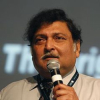Sugata Mitra

Sugata Mitra
Sugata Mitrais Professor of Educational Technology at the School of Education, Communication and Language Sciences at Newcastle University, England. He is best known for his "Hole in the Wall" experiment, and widely cited in works on literacy and education. He is Chief Scientist, Emeritus, at the for-profit training company NIIT. He won the TED Prize 2013...
NationalityIndian
ProfessionEducator
Date of Birth12 February 1952
CountryIndia
developing exist good places schools
There will always be places in the world where good schools don't exist and good teachers don't want to go, not just in the developing world but in places of socioeconomic hardship.
careers constantly exposed heroes pupils schools time tv
Too many pupils at schools in the U.K. want to have careers as footballers or TV hosts, or models, because that's what they're constantly exposed to as the heroes of our time.
clerks designed education empire exist produce schools
The Indian education system, like the Indian bureaucratic system, is Victorian and still in the 19th century. Our schools are still designed to produce clerks for an empire that does not exist anymore.
alone children computer left nine office reach secretary standard
In nine months, a group of children left alone with a computer - in any language - would reach the same standard as an office secretary in the West.
entertainment
Entertainment can be a more powerful driver than poverty.
fear focused information innate quest
We need a pedagogy free from fear and focused on the magic of children's innate quest for information and understanding.
children discovered information passing people
It would be better, in a way, if any adults present were completely uneducated. There is nothing children like more than passing on information they have just discovered to people who may not already have it - an elderly grandmother, for instance.
children coming comparison content kids learning memorize results rote test whatever whether
In most schools, we measure children on what they know. By and large, they have to memorize the content of whatever test is coming up. Because measuring the results of rote learning is easy, rote prevails. What kids know is just not important in comparison with whether they can think.
considered cyberspace except might people
I don't even want to guess at what computer literacy might do to children, except to say that if cyberspace is considered a place, then there are people who are already in it and people who are not in it.
certain employers force
You can force students to learn, to a certain extent, but students aren't happy and employers aren't happy.
books contained decide financial human knowledge operate points powers schools stored
Schools still operate as if all knowledge is contained in books, and as if the salient points in books must be stored in each human brain - to be used when needed. The political and financial powers controlling schools decide what these salient points are.
children inclined less standing
If children know there is someone standing over them who knows all the answers, they are less inclined to find the answers for themselves.
job recite teaching
Go to a job interview and tell and employer that you can recite the 17 times table; they don't care. Why are we still teaching it?
learning threatened
Too often we see that teachers and educational administrators feel threatened by self-organized learning. They, therefore, think it is not learning at all.